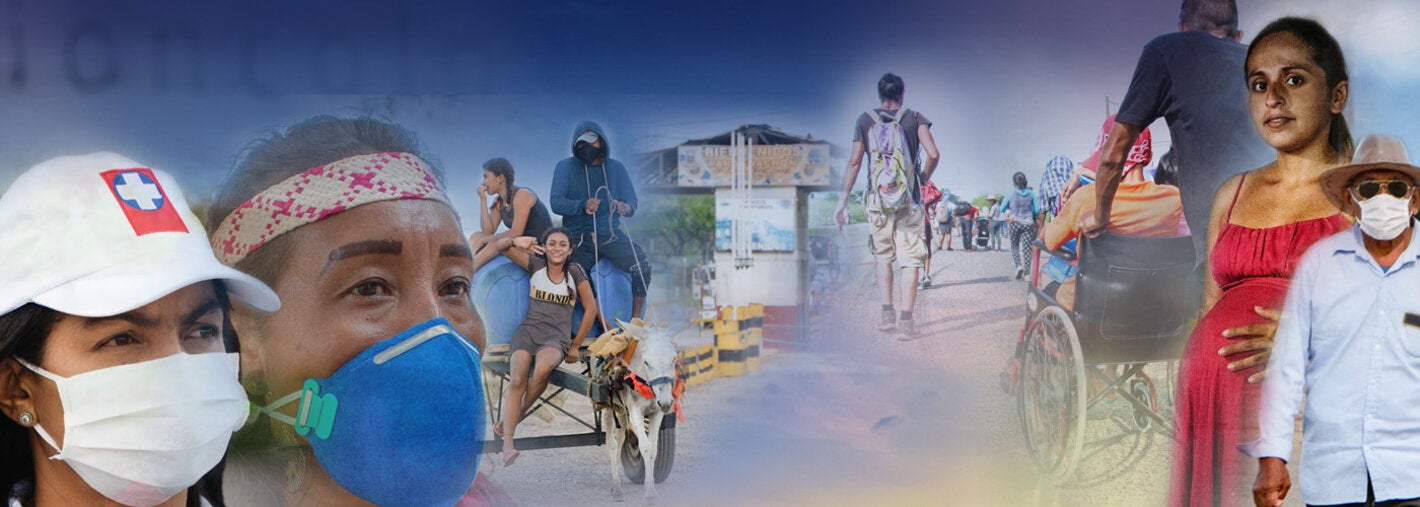
The agreement will focus on increasing and scaling-up interventions that address barriers to health care and the disproportionate impact of COVID-19 on migrant populations.
Washington D.C., October 9, 2020 (PAHO) – More than 70 million migrants living across international borders in the Region of the Americas are set to benefit from a joint agreement signed today by Carissa F. Etienne, Director of the Pan American Health Organization (PAHO) and António Vitorino, Director General of the International Organization for Migration (IOM).
Under the agreement, PAHO and IOM will focus on scaling up coordinated interventions to support countries of the Americas in addressing health and migration, while leaving no one behind. It will also ensure greater advocacy for the inclusion of the specific needs of migrants in health and development policy throughout the Region, both in the context of the COVID-19 pandemic and beyond.
“Migrants are one of the most vulnerable populations in our Region, facing huge barriers when it comes to accessing the health care they need,” said PAHO Director, Carissa F Etienne. “The COVID-19 pandemic is a stark reminder that no one is safe until everyone is safe, which is why this agreement between PAHO and IOM has never been so timely and so important,” she added.
Migration in the Americas
The number of international migrants in the Americas reached 70 million as of 2019. Since 2015, this migratory flow includes more than 5 million Venezuelans who now live in other countries of the world, particularly Colombia, Chile and Peru. And since 2018, a new trend has emerged consisting of large groups migrating from Central America towards Mexico and the United States.
Drivers of migration in the Americas include social and economic inequalities, political instability, conflict and environmental disasters. While many countries in the Region are sources of emigration to high-income countries in the Americas and Europe, Latin America and the Caribbean are also experiencing an increase in migrants from Africa and Asia. This places an additional strain on many countries’ under-resourced health systems.
“This initiative has been created precisely to address these challenges and will help stakeholders to coordinate and harmonize actions to enhance the health of migrants,” said IOM Director General, António Vitorino.
Health and Migration
The COVID-19 pandemic has impacted the delivery of health services throughout the Americas, which has experienced over 17 million cases and more than 574,000 deaths due to the virus.
While migrants face the same health threats as anyone else, these are compounded by precarious living conditions and a lack of access to basic services such as water, sanitation and nutrition. Migrants are also more likely to face poor and crowded working conditions within the informal economy, as well as legal, language and cultural barriers that make adhering to public health measures during the pandemic particularly difficult.
Separation from support networks, financial hardship and limited access to supplies and medication are also threatening migrants’ mental health and worsening pre-existing conditions.
Beyond COVID-19, many migrants in the Americas experience a range of communicable as well as non-communicable diseases that require urgent recognition and treatment. Diseases including malaria, tuberculosis, HIV/AIDS, diabetes and hypertension among migrant populations must be addressed.
The new agreement aims to improve access to health for this vulnerable population, and support countries in border health, including in emergency preparedness and response. It also aims to enhance action across sectors, including education, social welfare and protection, to better plan health interventions with a short-, medium-, and long-term vision.
The Pan American Health Organization (PAHO) works with the countries of the Americas to improve the health and quality of life of its population. Founded in 1902, it is the world’s oldest international public health agency. It serves as the Regional Office of WHO for the Americas and is the specialized health agency of the Inter-American system.
Established in 1951, the International Organization for Migration (IOM) is the leading UN-related agency in the field of migration and works closely with governmental, intergovernmental and non-governmental partners. IOM works to help ensure the orderly and human management of migration, to promote international cooperation on migration issues, to assist in the search for practical solutions to migration problems and to provide humanitarian assistance to migrants in need, including refugees and internally displaced people.



